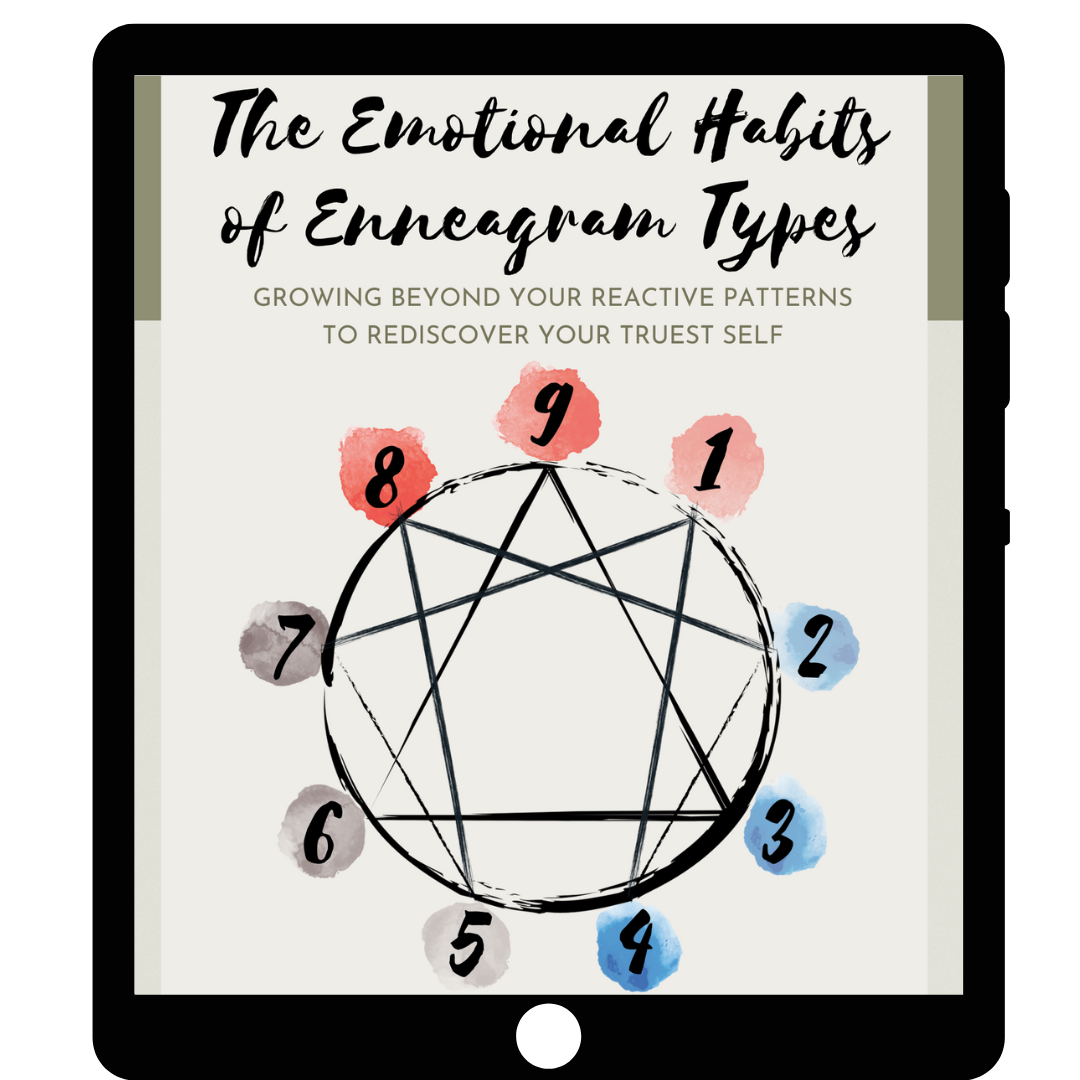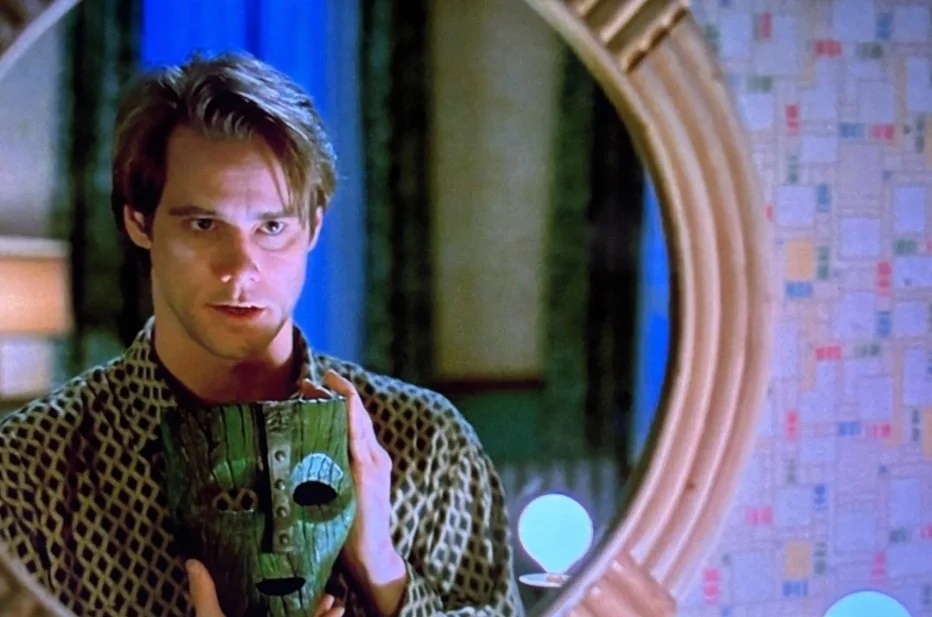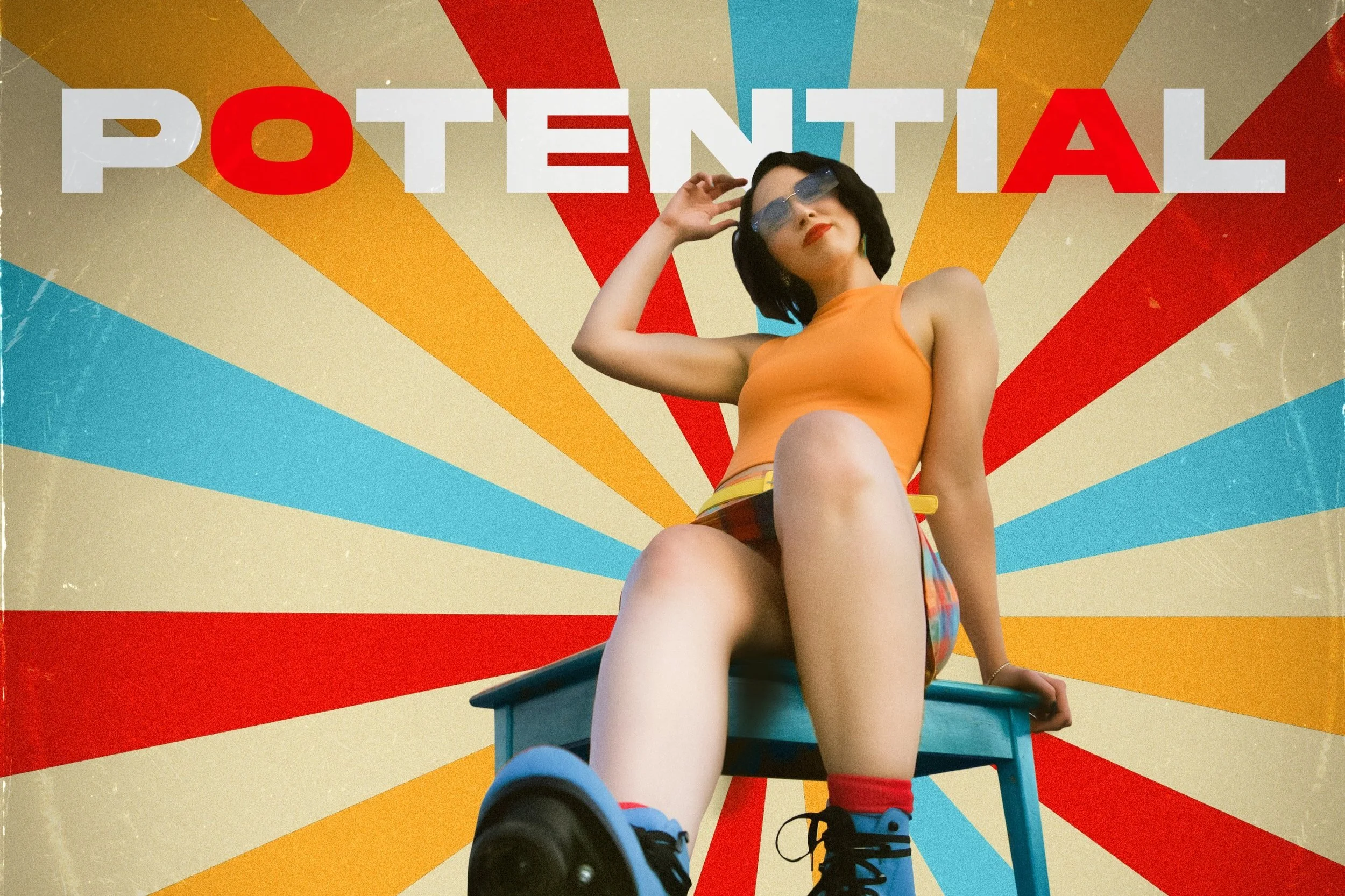Joanne Kim (OliveMe Counseling) & Melinda Olsen (Inviterra Counseling) are Enneagram therapists who love helping people grow beyond their reactive patterns of thinking, feeling, and doing.
Our Enneagram type patterns used to be helpful when we were actually vulnerable and powerless (often in childhood), but when we grew up, our autopilot patterns didn't update accordingly. What used to be our greatest strengths eventually become some of our greatest liabilities.
In this 4-part series on The Emotional Habits of Enneagram Types, learn about:
The main themes of the Head Triad
The central emotion for Head Types: Fear
How Enneagram Fives, Sixes, and Sevens navigate fear
Growth steps for each Enneagram Type
Watch the video below for Part 4: Head Types (or keep scrolling past the downloadables for the transcript!)
Downloadables
Grab each of these guides separately!
Video Transcript
Joanne: Welcome to our part four in this four part series, “Enneagram Emotional Habits”.
Melinda: Hi, everybody.
Today we're going to talk about Head Types, which interestingly are the Types that mystify us the most. But we love them. We've done a lot of study around them. I am married to a Head Type, so I have a little insight into Head Types.
Joanne: A lot of our main coaches and therapists have been Sixes.
Melinda: We're super grateful for that because we really need that as people who tend to undervalue the head.
Joanne: Regarding all the Triads they have their own corresponding themes. The main themes for Head Types, in particular, are around safety, security, certainty, trust and mistrust, and making sure they're okay. The way that each Type goes about it is different. The central emotion for all Head Types is around fear.
I think Fives tend to be in conflict with their fear, Sixes tend to overdo fear, and Sevens tend to underdo fear.
Would you like to share with us about our lovely Fives?
Melinda: I really would. I love Fives, not just because I'm married to a Five, but because I feel like Fives are really misunderstood. As a Two, I relate to that because I think we're also misunderstood.
Fives, like I mentioned, though they are cut off from their feelings, because of them being Head Types they tend to actually have a quite conflicted or chaotic relationship with sadness. They tend to be a Type that leans more toward depression than the other two Types, and that's because they tend to isolate themselves.
I love this metaphor that Joanne came up with. It's like Fives are in a fortress with doors that are barred and locked. They are looking out and sometimes feeling the sadness or longing, wanting to be included, but terrified of allowing that door to open because they don't want to be overtaken or overwhelmed.
The themes for Fives often are around feeling fear that they're going to be overwhelmed by others. Their energy is going to be depleted. They won't have enough resources to get through the day or get through their lives. So they tend to be very protective of their energy, their time, even their stuff, and their knowledge. They tend to be very locked in.
If we take that metaphor of the fortress with the doors locked, unfortunately, what they don't realize is that if they were to just open the doors they might be able to get the resources they need to get through the day and the connections that they need. But unfortunately, fear keeps it locked.
Fives aren't really always in touch with their fear. They've cut off their heart and their bodies and tend to live in their heads because they protect themselves from this fear by knowing things, through knowledge. Fives collect knowledge. They store it up. The one thing that they allow in through those doors is the knowledge of everything. The things that they're really passionate about, their jobs, certain subjects, whatever. They bulk up on knowledge to defend themselves against being insecure. To defend themselves against feeling afraid in the world and to make themselves safe. Unfortunately, that means that they miss out on their emotions and connections. Emotions are the things that connect us with other people and connect us with ourselves. Fives really have an experience of not being connected with themselves and others.
I actually think more than most people admit, Fives really on some level understand that, which is why they tend toward depression. They understand that they're cut off and they isolate and they have a very hard time reaching out. It's almost like they're frozen. This is why I feel so sad about Fives because they’re so beautiful and sensitive and they themselves don't know that and the people in their lives tend to not know that.
Joanne: Of the BIG Five emotions, MAD, SAD, GLAD, SCARED, NUMB, NUMB is probably their favorite emotion. Also in that they're very good at rationalizing why they should stay NUMB. Also pursuing things like careers that tend to be right in alignment with their giftings. It's like, in a lot of ways, it kind of is a mutually reinforcing echo chamber.
Melinda: Yeah, I also find with Fives, much like Ones, they tend to somaticize their emotions. Like when you’re NUMB emotions have to come out. It means you're overwhelmed. Emotions have to come out some way. Often with Fives they come out with stiffness or issues with their back, feeling achy, sometimes nausea, and sometimes with depression. Fives are deeply sensitive people.
Joanne: That might be the growth step. You could actually use the body as a backdoor way of connecting with the heart. Noticing that you feel a certain ache or tension or whatnot and trying to translate that into corresponding to whatever feelings they might have.
Melinda: You might want to ask a close friend, should you have that, or your partner, if they are more feelings conversant. It might be helpful to let them know like, “Hey, I have this ache or I have this nausea. Is there a corresponding feeling with that?” You might not be able to connect the two but they might be able to help you. That actually is a secondary growth step, which is asking for help, which I know is difficult for Fives, as well.
Joanne: Let down that drawbridge, man.
Melinda: Yeah, because there's so many resources that are there and ready for you if you allow things in.
We love you Fives. Good luck with your challenge. Do we want to move on to Sixes?
Joanne: Sixes are hard to peg in a lot of ways and I think that comes to the territory of the Type itself. There's a lot of shifting going on on the vagrant side, especially in their heads.
Sometimes they're known as “The Contrarians” or “Devil's Advocate”, “The Questioner”, “The Loyalist”. All these contradictory terms, ironically. I think that also shows up when it comes to their own emotions, too. It’s just that there's always this questioning and never a settling. So, I would say that as a Head Type they're the feelers of the Head Type. They tend to be most driven or most obviously connected to fear as an emotion but they intellectualize it so much that they might not even register it as a feeling.
Melinda: Yeah. It depends on the subtype usually. With Sixest there tends to be a pretty big stratification of how you experience the feeling based on your Subtype.
Sexual Instincts tend to face fear head on, so they might be the type that are less connected with their experience of fear. Though I've found that fear is still something pretty dominant for Sexual Subtypes and Sixes. It's just that they're like, “Fuck you fear, I'm gonna go at ya.”
Joanne: Fight mode.
Melinda: Socials tend to be pretty removed from their fear.
Joanne: More NUMB.
Melinda: It's a more NUMB kind of feeling. They might do the things that the other two Types do in terms of fear. They might have some conscious understanding that they feel it, but I think they tend to withdraw from it a little more, tend to be a little more distant.
Self-preservation Sixes are the ones that we're kind of going to peg as the stereotypical Six. They tend to be very anxious. That's how we talk about Sixes. Overdoing fear. Self-pres Sixes are going to be the ones that are really obvious about it. Whichever one you identify with, we would say that you have kind of an over-active relationship with fear. That tends to show up for Sixes regardless of Type or Subtype as kind of the catastrophizing and the over preparation, just in case something bad happens. Would you say that's your experience with Sixes?
Joanne: Totally. Being more future oriented, they focus on what could happen and what could happen is more negative.
Mistrust is what leads the way and the emotion that I think Sixes have the hardest time connecting with is probably joy. And that like, “When's the other shoe going to drop?” as if there's always another shoe. Or like, “What does this person want from me? Are they being honest?” There's always like frenetic energy to them.
I think even though Sixes are driven by fear they might not consciously be aware of it because they're so in their head and they're very good at justifying things. If you tell a Six they're being pessimistic, they would say, “I'm just being a realist.”
Across all Head Types they're so good at justifying their own position. I think that only reinforces the disconnect from the heart.
Melinda: For Sixes, I think one other thing to put out there is that the way that they try to find security, again is probably different per Subtype, but I think the thing that holds true with all of them is that they have a very difficult time finding security. Even when they either reach out, no matter how they try to do it, either finding security in their connections or other people, finding security in an authority or a dogma, or a way of viewing the world, or finding security and going at your fears, like balls to the wall. Whatever Sixes try to connect with and try to find security in, what remains true, is that they have a very hard time trusting and finding security within themselves.
The world out there is scary and the world in here is scary. I can't trust anybody out there and I can't trust anybody in here. That causes a huge, huge amount of insecurity and fear. Of course it would, because if you can't find safety anywhere, then you have to work really hard in order to make it happen. It's tenuous at best. Sixes kind of find themselves in a jam. I feel for them. That's really hard. Onto our growth step.
Joanne: I think being in touch with your fear. Being honest about it is one thing and allowing yourself to temper the questioning a little bit more, 5% less questioning than before.
Melinda: Dialing it down just a tad.
Joanne: Because you might be creating your own anxiety, ironically. If that's the case it can also go the other direction. If you look for what is okay, even though things could go bad, then you might actually create another feedback loop where you start noticing things that are actually okay, even though it could be bad or it could be worse. So, giving more attention, more room towards things still being okay, being steady, being secure, that would be the recommendation.
Melinda: We hope that you feel like you can engage that challenge Sixes. Good luck. We Heart Types love you.
I think we're going to move on to Sevens.
Joanne: In a lot of ways, Sevens are the opposite of Sixes in that Sevens also focus on what could be, but towards the positive. I think whenever people find out what their Enneagram Types are, everyone else except for Sevens are like, “Oh, it's terrible. Why are you so negative?”
Sevens are like, “This is great. I love my Type.”
Usually those who are in close relationships with Sevens are like, “Oh my god, I'm so tired. I feel so resentful and negative because Sevens tend to be positive.”
GLAD for Sevens is a defense structure in that it's an overdoing of the positive emotion as a way of downplaying or ignoring the negative stuff.
Melinda: Especially fear. Of the Triad, I think they underdo fear.
Joanne: I don't think Sevens are as aware or conscious about their fear. One way to find out is they still look for the exits too when it comes to difficult conversations or whatnot. They just rationalize. That is the main defense mechanism, rationalization. They find their way to sweet talk their way out of focusing on difficult things, responsibilities, things that are boring, etc. Not knowing that they're weaseling out of things is actually what makes situations harder.
Melinda: I think that's the way that Sevens actually act out their fear. If you're a Seven, think about things being sad, feeling trapped in that sadness, never being able to get out of your sadness. That's fear, right? Sevens have a fear of being trapped in negative emotions. Actually, Sevens have a fear of being trapped in general.
Joanne: Keeping your options open, making sure you get to choose into the more fun or exciting or better thing.
Melinda: Exactly. What Sevens have a hard time doing, I think every Enneagram Type has a hard time with this, but being in the present. What they fail to understand, sadly, is that only when we're open to every emotion in the present and what's happening in the present do we actually connect with JOY. I think JOY is what Sevens are trying to connect with, but unfortunately, it doesn't happen if we're not connected with all of the feelings.
Joanne: Lower hanging fruit growth stuff for Sevens, because I'm not sure if y'all are eager to jump into the deep end just yet.
Melinda: And that's okay.
Joanne: Is to practice alternating between doing something exciting and something that is a little bit more blah. Just so that you still get the stuff going but you're not going to be completely trapped in it. There is an overemphasis on seeking freedom by resisting limits. But freedom and limits actually go hand in hand.
It's kind of like the fencing around a playground structure. Within the fencing you can go wild and do whatever you want, but you’ve got to make sure to stay within so that you're not at risk of danger. It’s the same thing with our life's experiences. There are responsibilities and things that must be done but that is actually what empowers you and frees you up to actually really engage things and enjoy the deeper things in life without this nagging thing in the back of your head. Like, “I know you shouldn't be doing this.” Make it easier on yourself.
Someone said, “Swallow the frog.”
Do the thing that you don't want to do first and then you can reward yourself with a fun thing.
Melinda: That's a great challenge.
I think also remembering too, in the same way, engaging all your emotions eventually is the thing that leads to true JOY and freedom. I know it sounds very counterintuitive, especially for Sevens, but allowing yourself to be able to be present with what is, whether it be good or bad or neutral, is the thing that then frees you from actually being enslaved to positive or good vibes. Which actually is what Sevens are. You actually are trapped. That's the reality.
Joanne: The bias of Head Types is that there's such a high emphasis on reasoning, rationale, the intellect, et cetera. Often all Head Types tend to think that they're just being mature, reasonable, grounded, and everyone else, especially those with feelings, are being immature, irrational, whatever. It's just that the ironic thing is, if our body and our heart are also other legitimate sources of really important information the irrational thing is to lop off or close off access to those other centers of intelligence.
Melinda: How rational are you being if you lop off two incredibly important ways of viewing and interpreting the world.
Joanne: It's actually irrational for you to only favor certain data and ignore everything else.
High recommendation for all y'all Head Types to really get to know emotions and also your body experiences as a really important source of information. It seems irrational on the outside, but that's because no one really trained us on how to do feelings well. It is a huge, strong belief of mine that each of the BIG Five emotions, MAD, SAD, GLAD, SCARED, NUMB, and also SHAME as well, have their corresponding themes and messages about what we're needing and what we're wanting, who we are, et cetera. So, to close off the door to your heart space is a huge disadvantage for you because you're basically living life blind. It's a huge part of you.
We have a couple of resources for everyone. We have a quick, at a glance view of how each Enneagram Type interacts with each of the BIG Five emotions. Also a more in-depth guide, because I know y'all want to do your research, right? This guide, “The Emotional Habits of Enneagram Types”, has a more thorough look as to what's really going on, not just with the main emotion of the Triad, but what each emotion actually means and what they're for.
Melinda has created another guide for us, “Growth Tip of the Enneagram Types”.
Melinda: I made this especially for y'all who are really just wanting to get into the nitty gritty of growth and deep transformation. The Enneagram is amazing for that and it's so much more than just descriptors of our core Types. I hope that these tips and challenges will help you to get even deeper into knowing your essential self and fighting against and becoming more aware of your ego patterns. As you get to know your essential selves, I think you'll find that they actually look a lot different than your core Type, which is pretty surprising. I developed this guide with a few tips for y'all who are really wanting to grow more deeply in your Enneagram journey. These have been helpful for us so I wanted to pass this on to y'all with more to come.
I think you're Big Feelers First Aid Kit might be a good thing for our Head Types, too.
Joanne: I also made a separate guide specifically for those whose feelings tend to show up sideways and show up at the wrong place at the wrong time. For example, like a lot of Fives tend to call out sick from work because they stuffed their feelings so much that the body somaticized it. In order to prevent people from just locking up their feelings, this is kind of an alternative where you can buy yourself time if your feelings are showing up in more sideways ways. The point is to actually dedicate a specific time and space for you to actually sit with and process your feelings, not just way after the fact because they get more confusing. I'm sure y'all don't like that. Also grab the Big Feelers First Aid Kit as an additional resource, a handy tool to put into your library.
In general Head Types, one of the main areas of challenge is around relationships. So, don't just study about your own specific Type patterns, but also listen in on the Body Types and the Heart Types, as well.
Thanks again for joining us here for our series and we'll catch you next time.
What are your Enneagram type's emotional habits?
Grab this free guide that shows you how to grow beyond the patterns that keep you stuck!
Don't know your Enneagram type? Find yours here!
© Copyright 2023 Joanne B. Kim. All rights reserved.
JOANNE B. KIM, LMFT
Joanne is a Licensed Marriage & Family Therapist and Certified Brainspotting Practitioner in San Jose, CA. She helps people EXHAUSTED by anxiety, shame, and an allergic reaction to anger create VIBRANT relationships where they matter, too.
Many of her clients are:
(1) the highly responsible, conscientious, and empathic types
(2) Enneagram Type Ones, Twos, Fours, or Nines
(3) Highly Sensitive Persons (HSPs)
The most common words spoken by those who’ve sat with Joanne:
“I thought it was just me. I’m NOT crazy!”
“I can finally figure out what to do with all these feelings!”










































In a conversation with Catherine Quiring of the Coming Home to Ourselves Substack, we explore the Enneagram through the lens of the show Ted Lasso, going into the importance of emotional intelligence, the role of instincts & subtypes in the Enneagram, and how these concepts can help individuals navigate their personal growth and relationships.